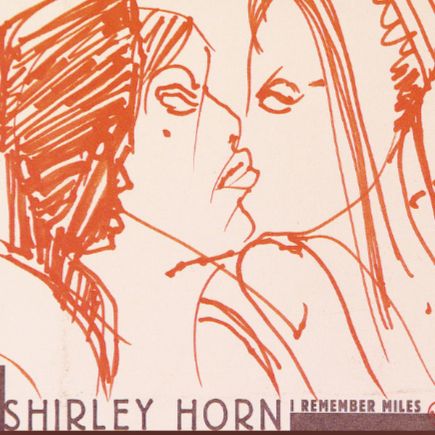Shirley Horn, l’art du temps suspendu
Chanteuse et pianiste américaine au style inimitable, Shirley Horn demeure l’une des grandes figures du jazz vocal, capable de redéfinir l’art de l’interprétation par la lenteur, la nuance et l’intensité émotionnelle. Née à Washington D.C., elle débute le piano à l’âge de quatre ans et révèle très tôt une oreille exceptionnelle. Formée à la musique classique avant de découvrir le jazz à l’adolescence, elle développe un rapport intime à l’instrument, où chaque note devient un prolongement de sa voix.
En 1954, elle fonde son premier trio, imposant déjà cette alliance subtile entre rigueur harmonique et sensualité rythmique. Son premier album, Embers and Ashes (1960), attire immédiatement l’attention de Quincy Jones et de Miles Davis. Séduit par son approche dépouillée et sa sensibilité unique, Davis l’invite à assurer la première partie de ses concerts au Village Vanguard de New York, un geste rare pour un musicien aussi sélectif. Shirley Horn enregistre ensuite trois albums entre 1963 et 1965, dont Shirley Horn with Horns et Travelin’ Light, avant de se retirer temporairement pour fonder une famille.
Ce n’est qu’au début des années 1980 qu’elle revient sur le devant de la scène, avec une maturité nouvelle. Entourée de ses fidèles musiciens — Charles Ables à la basse et Steve Williams à la batterie —, elle retrouve ce format de trio intimiste qui deviendra sa signature. Son retour s’accompagne d’une série d’albums acclamés, notamment You Won’t Forget Me (1991), sur lequel Miles Davis, peu avant sa mort, appose sa trompette comme un ultime hommage.
En 1998, Shirley Horn reçoit le Grammy Award du meilleur album vocal de jazz pour I Remember Miles, disque profondément émouvant où elle rend hommage à celui qui fut à la fois son mentor et son ami. Suivent You’re My Thrill (2001) et May the Music Never End (2003), deux albums d’une élégance sobre, où elle confie pour la première fois le piano à George Mesterhazy et Ahmad Jamal, ce dernier accompagnant une chanteuse pour la première fois de sa carrière.
Shirley Horn possédait une capacité rare: celle de faire du silence une part intégrante de la musique. Sa voix, douce et feutrée, semblait modeler le temps lui-même, créant une intimité bouleversante entre la chanteuse et son auditeur.
Shirley Horn, el arte del tiempo suspendido
Cantante y pianista estadounidense de estilo inconfundible, Shirley Horn permanece como una de las grandes figuras del jazz vocal, capaz de redefinir el arte de la interpretación a través de la lentitud, la sutileza y la intensidad emocional. Nacida en Washington D.C., comenzó a tocar el piano a los cuatro años y reveló muy pronto un oído excepcional. Formada en música clásica antes de descubrir el jazz en la adolescencia, desarrolló una relación íntima con el instrumento, en la que cada nota se convierte en una extensión natural de su voz.
En 1954 fundó su primer trío, imponiendo ya esa combinación sutil entre rigor armónico y sensualidad rítmica. Su primer álbum, Embers and Ashes (1960), llamó inmediatamente la atención de Quincy Jones y Miles Davis. Seducido por su enfoque sobrio y su sensibilidad única, Davis la invitó a abrir sus conciertos en el Village Vanguard de Nueva York, un gesto poco común para un artista de su nivel de exigencia. Entre 1963 y 1965, Shirley Horn grabó tres álbumes, entre ellos Shirley Horn with Horns y Travelin’ Light, antes de retirarse temporalmente para formar una familia.
A principios de los años 1980 regresó a los escenarios con una madurez renovada. Acompañada por sus fieles músicos —Charles Ables al bajo y Steve Williams a la batería—, recuperó ese formato de trío íntimo que se convertiría en su sello. Su regreso estuvo marcado por una serie de discos aclamados, entre ellos You Won’t Forget Me (1991), en el que Miles Davis, poco antes de morir, añadió el sonido de su trompeta como un homenaje final.
En 1998, Shirley Horn recibió el Grammy al Mejor Álbum Vocal de Jazz por I Remember Miles, un disco profundamente conmovedor en el que rinde tributo a su mentor y amigo. Le siguieron You’re My Thrill (2001) y May the Music Never End (2003), dos obras de sobria elegancia en las que, por primera vez, cede el piano a George Mesterhazy y Ahmad Jamal, quien acompañó a una cantante por primera vez en su carrera.
Shirley Horn poseía una capacidad rara: hacer del silencio una parte esencial de la música. Su voz, suave y aterciopelada, parecía moldear el tiempo mismo, creando una intimidad conmovedora entre la intérprete y su oyente.
Shirley Horn, l’arte del tempo sospeso
Cantante e pianista statunitense dallo stile inconfondibile, Shirley Horn rimane una delle grandi figure del jazz vocale, capace di ridefinire l’arte dell’interpretazione attraverso la lentezza, la sfumatura e l’intensità emotiva. Nata a Washington D.C., inizia a suonare il pianoforte a quattro anni, dimostrando fin da subito un orecchio eccezionale. Formata nella musica classica prima di scoprire il jazz durante l’adolescenza, sviluppa un rapporto intimo con lo strumento, in cui ogni nota diventa un’estensione naturale della sua voce.
Nel 1954 fonda il suo primo trio, imponendo già quella sottile combinazione tra rigore armonico e sensualità ritmica. Il suo primo album, Embers and Ashes (1960), attira immediatamente l’attenzione di Quincy Jones e Miles Davis. Affascinato dal suo approccio sobrio e dalla sua sensibilità unica, Davis la invita ad aprire i suoi concerti al Village Vanguard di New York, un gesto raro per un artista della sua statura. Tra il 1963 e il 1965, Shirley Horn incide tre album, tra cui Shirley Horn with Horns e Travelin’ Light, prima di ritirarsi temporaneamente per dedicarsi alla famiglia.
All’inizio degli anni ’80 torna sulla scena con una maturità nuova. Affiancata dai suoi fedeli musicisti —Charles Ables al basso e Steve Williams alla batteria—, ritrova quel formato di trio intimo che diventerà il suo marchio. Il ritorno è segnato da una serie di dischi acclamati, tra cui You Won’t Forget Me (1991), nel quale Miles Davis, poco prima di morire, aggiunge la sua tromba come omaggio finale.
Nel 1998 Shirley Horn riceve il Grammy Award per il Miglior album vocale jazz con I Remember Miles, un disco toccante in cui rende omaggio al suo mentore e amico. Seguono You’re My Thrill (2001) e May the Music Never End (2003), due album di elegante sobrietà in cui, per la prima volta, affida il pianoforte a George Mesterhazy e Ahmad Jamal, che accompagna una cantante per la prima volta nella sua carriera.
Shirley Horn possedeva una dote rara: quella di trasformare il silenzio in parte integrante della musica. La sua voce, morbida e vellutata, sembrava modellare il tempo stesso, creando un’intimità profonda e commovente tra la cantante e l’ascoltatore.
Shirley Horn, the art of suspended time
An American singer and pianist with an unmistakable style, Shirley Horn remains one of the great figures of vocal jazz, capable of redefining the art of interpretation through slowness, subtlety, and emotional depth. Born in Washington, D.C., she began studying piano at the age of four and quickly displayed an exceptional ear. Trained in classical music before discovering jazz in her teenage years, she developed an intimate relationship with the instrument, where each note became an extension of her voice.
In 1954, she formed her first trio, already blending harmonic precision with rhythmic sensuality. Her debut album, Embers and Ashes (1960), immediately caught the attention of Quincy Jones and Miles Davis. Captivated by her understated approach and singular sensitivity, Davis invited her to open his concerts at New York’s Village Vanguard—a rare honor from such a discerning musician. Between 1963 and 1965, Shirley Horn recorded three albums, including Shirley Horn with Horns and Travelin’ Light, before stepping away temporarily to start a family.
In the early 1980s, she returned to the stage with newfound maturity. Surrounded by her loyal musicians—Charles Ables on bass and Steve Williams on drums—she reestablished the intimate trio format that became her signature. Her comeback was marked by acclaimed recordings, including You Won’t Forget Me (1991), on which Miles Davis, shortly before his death, added his trumpet as a final tribute.
In 1998, Shirley Horn received the Grammy Award for Best Jazz Vocal Album for I Remember Miles, a deeply moving homage to her mentor and friend. This was followed by You’re My Thrill (2001) and May the Music Never End (2003), two albums of understated elegance where she, for the first time, handed the piano to George Mesterhazy and Ahmad Jamal—the latter accompanying a singer for the first time in his career.
Shirley Horn possessed a rare gift: the ability to make silence an integral part of music. Her soft, velvety voice seemed to shape time itself, creating a deeply intimate connection between the singer and the listener.


